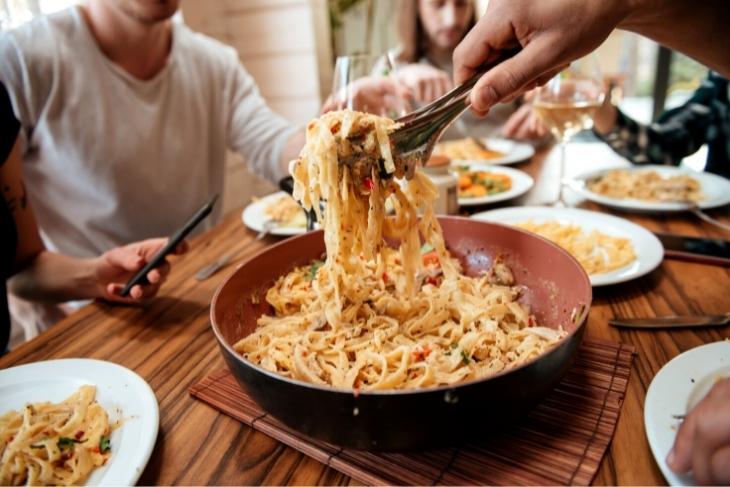Myth Busting: Is eating carbs at night bad for weight loss?

This blog was written in collaboration with our partners at GI Foundation. For more Low GI inspiration and education visit gisymbol.com.
When it comes to weight loss and diets, carbohydrates are often seen as a no-no. Many people believe that carbohydrates make you gain weight, and that low-carb diets are the best way to lose weight. In this post, we outline what carbohydrates are and why we need them, while de-bunking the myths about dieting and not eating carbohydrates at night.
What are carbohydrates?
Carbohydrates are fuel for the body’s engine. In fact, they are the main energy source for your body, muscles and brain.
Carbohydrates come from the sugars and starches in food. When you eat a slice of bread, for example, the digestive process breaks the carbohydrate down into glucose and then releases insulin to help transport the glucose to your cells to be used for energy.
Carbohydrates help your body thrive and low GI carbs are your friend. Foods like wholegrain bread, noodles, oats, legumes and beans provide vital nutrients while keeping your energy levels even and balanced, and your gut happy.
Myth Busting: Can you eat carbs at night and still lose weight?
When it comes to carbs and weight loss there is a lot of misinformation - particularly when it comes to the timing of meals and whether you should limit carbs at night.
The great news is that there’s no evidence to suggest kilojoules from carbs are any more fattening in the evening than those eaten at other times of the day.
It’s the overall energy balance of the kilojoules eaten over the whole day versus the kilojoules (energy) used by the body that over time will lead to weight gain or loss.
Will reducing carbs at night help me lose weight?
Reducing or cutting out carbs at night can be a simple way of reducing your overall daily energy or kilojoule intake. But if an unbalanced meal leaves you feeling hungry and sends you in search of snacks an hour later, then that’s not a great choice either.
Are you trying to lose weight? Read our comprehensive guide on weight loss to understand where to begin, what happens when you lose weight, and what doesn't work when it comes to dieting.
Are carbohydrates fattening?
Carb foods themselves are not fattening, no matter when you eat them. In fact, no single food is fattening! Our bodies are incredibly efficient when it comes to overall energy balance and doesn’t discriminate when we eat carbs. The maths is simple, if we eat too many kilojoules for our energy needs that will result in weight gain.
Does late-night eating affect my weight loss?
If you’re trying to control your weight, late-night eating may hinder your efforts simply because of the types of foods you may be eating. It may help to have a cut-off time at night for eating so you get out of the habit of grazing.
Is the CSIRO Total Wellbeing Diet low-carb?
The CSIRO Total Wellbeing Diet is not a low-carb plan. It is a higher protein, moderate-carb (low GI) eating plan based on a wide body of research, including clinical trials conducted by CSIRO.
The balance of food groups in the CSIRO Total Wellbeing Diet helps you lose weight by keeping you feeling fuller for longer. Plus, by including all food groups, you get all the essential nutrients you need for optimal health.
Research has shown that a higher protein, low GI diet can lead to greater weight loss and healthy weight maintenance. The style of eating combined with exercise is one of the most effective ways to improve your overall health and wellbeing.
If you would like to get a feel for our program and see why we’re Australia’s number 1 rated weight loss program, sign up for our FREE 3-day taster.


